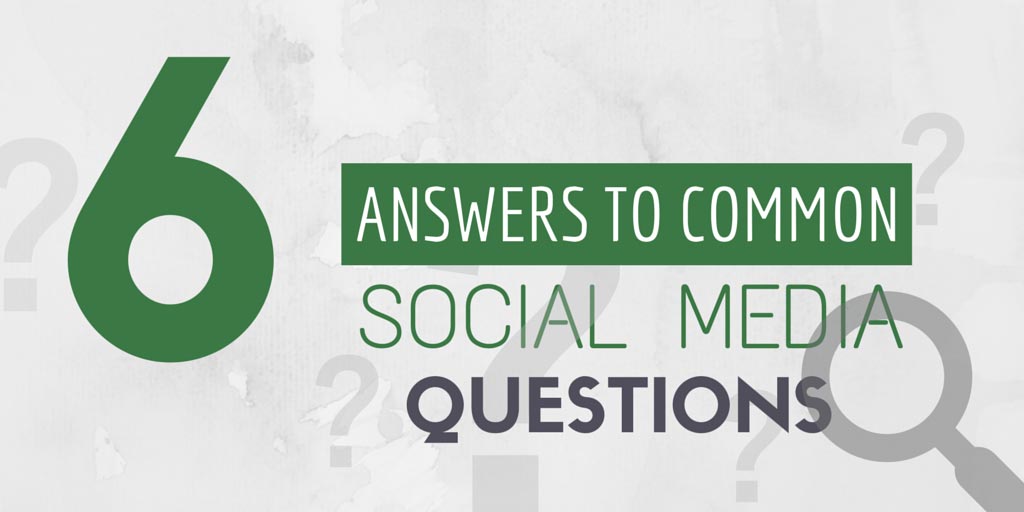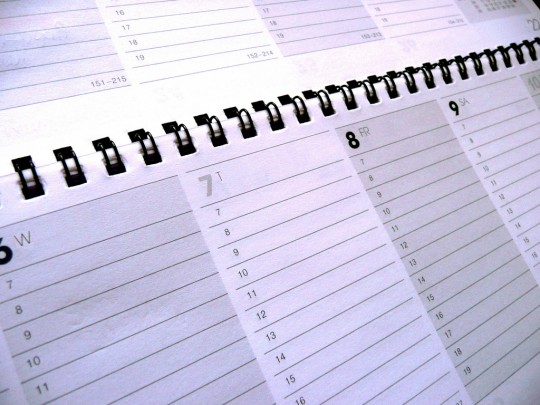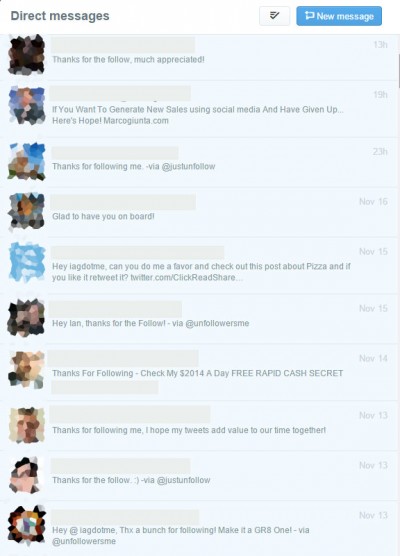6 Answers to Common Social Media Questions

Let's face it; when it comes to social media, we're all still learning. Sure, some people call themselves Social Media Gurus and experts, but the truth is, we're all still finding our way. Many of us have spent time on social media researching, strategizing, tweaking, analysing, playing and reporting. However there are always going to be questions, and asking questions is a great way to learn!
In this article, I cover six common social media questions, and I'll attempt to answer them!
#1 Should I send LinkedIn connection requests to people I don't know?
Should I accept LinkedIn connection requests from people I don't know?
- Quick Answer: No
- Slightly Longer Answer: Technically you shouldn't send connection requests to people you don't know, but there are exceptions to this rule. It's up to you whether you want to accept connection requests from people you don't know- there are some advantages and disadvantages in this.
It's a common question, and it comes down to the fact that LinkedIn is very different to other social networks such as Facebook and Twitter. LinkedIn is a professional network and aimed primarily at business connections. To connect with someone on LinkedIn, you both need to agree to this connection i.e. it's a reciprocal 2-way connection - just like Facebook friends.
The question definitely divides the marketing community, and you'll see passionate arguments on both sides! My view is that it is down to your marketing strategy. Technically sending a connection request to someone you don't know is against the LinkedIn User Agreement. If someone receives a connection request from someone they don't know they can respond by checking "I don't know this person". LinkedIn monitors the amount of "I don't know"s and once you reach a certain amount, you can get a warning and potentially your account could be restricted.
My strategy is to only send and receive connection requests to/from people I know in some way. That could mean I know them in person, or I could have exchanged emails or had a conversation on another network such as Twitter. I know some people advocate growing your network as large as possible. Despite that going against LinkedIn's terms, I can kind of see the logic in that strategy, but it doesn't work for me. Can you vouch for all your connections? What if someone asks how you know one of your connections? That happened to me once, and because I had just accepted this person (someone that I didn't really know) I wasn't able to say anything about them. Don't chase numbers- chase real connections and real relationships!
Having said that, there are exceptions to this rule. Social media is mainly down to building relationships. Why should LinkedIn be any different? If you don't know the person, have a look at their profile and see whether it would be helpful to connect to them - if they are someone relevant and influential. If you really don't know them, then reply personally to start with a conversation. Many do reply and we get to know each other from then on. Unfortunately, some never replied and it was fairly obvious that they weren't interested in connecting with me as such, but just chasing numbers.
Related Articles:
- How to be a Social Media Guru in 20 Steps (An IRONIC POST, Seriously Social)
- 3 Ways to Annoy People with LinkedIn Invitations (Petra Fisher)
#2 How do I get more followers on Twitter?
- Quick Answer: It's not about followers- it's about community and relationships
- Slightly Longer Answer: Don't just chase followers. If you do, you could end up with lots of irrelevant followers who never engage with you. Instead seek to build a community of people who want to engage with you.
It might sound controversial, but the number of followers you have isn't everything! It can make you look good if you have loads of followers, but at the end of the day, you need to make sure you are getting followers who are relevant to you. Instead of asking the question on how to increase your followers, it's better to ask how to build your community on Twitter. It's far better to have a small number of engaged followers who are interested in what you are saying and interact with you regularly. Having 50,000 followers or fans might make you feel important, but is that your ultimate goal? How about building existing relationships, or creating new ones? How about increasing sales? Surely those are better goals to achieve?
If you're interested in building up your community and building your relationships, then there is a better question to answer. Here are some tips:
- Use a tool such as Klear* to help you find influencers in your area. Follow the people your influencers/competitors follow - Once you find the people your competitors or influencers follow, you can start to follow them. The people they follow are likely to be the ones you'd like to follow.
- Use the tool Commun.it* - it's a social media relationship tool which helps you find and build your community on Twitter.
- Regular quality posts - make sure you are consistently posting quality and relevant content- the kind of stuff that the people you want to follow you will like.
- Comment/mention/get involved - get involved with your community and reply to the tweets of the people in your community. It's a way to build relationships and nobody likes a timeline of one way tweets.
- Say more than thank you- if someone retweets you or shares your stuff, don't just say "thank you" - turn the situation in to an opportunity.
- Use relevant hashtags - a lot of people use Twitter search or follow a particular hashtag. You'll extend your reach significantly if you do this. Use a tool such as Ritetag
- Be a giver and not just a taker- be authentically helpful.
Related Articles:
- Approach the Social Web with Authentic Helpfulness and Good Things Happen (Mark Schaefer, Businesses Grow Blog)
- How to be a Social Media Guru in 20 Steps (An IRONIC POST, Seriously Social)
- How to Build and Manage Your Twitter Community with Commun.it (Seriously Social)
- How to get Twitter Followers (Rignite Blog)
#3 Should you always follow back?
- Quick Answer: No
- Slightly Longer Answer: No. It's always best to review each follower and make a decision with each one. Otherwise you'll end up following irrelevant, spammy or obscene Twitter accounts.
This would be a better question if it asked "When should I follow back?". In an ideal world, only people who were genuinely interested in you and your posts would follow you. However, people follow a social media account for many reasons:
- Because they love that business or brand
- Because they are interested in their posts
- Because they want them to follow them back
- Because they want to spam them
- Because they want to bombard them with obscene posts and links
You could automate the process, like some people do, and automatically follow everyone back. However, it's highly probable that you'll end up following some rather unsavory types - spammers and obscene accounts. It's even more probable that you'll end up with lots of followers who will never engage with you. They could be dormant accounts or accounts totally irrelevant to you and who will never engage with you.
My approach is to check the people who followed me and see if they are relevant. More often than not I will follow them back. I'm not so concerned about a cluttered timeline on Facebook and Twitter because I use lists. That allows me to zoom in and not miss the updates from people I really want to follow. It's quite easy to spot spammers and irrelevant profiles, and using a tool such as ManageFlitter can really make this easy.
Related Articles:
- Twitter Marketing with Mark Schaefer (Social Media Marketing Podcast, Social Media Examiner)
- How to be a Social Media Guru in 20 Steps (An IRONIC POST, Seriously Social)
#4 How often should you blog or post on a social network?
Photo Credit: photosteve101 via Compfight cc
- Quick Answer: It depends!
- Slightly Longer Answer: There isn't an easy answer to this question. First of all, it's best to ask yourself why you want to blog at all! What are you trying to achieve? Once you answer this, you'll need to work out how long and in-depth your posts will be and how long it will take you to write them. The frequency of your social media posts is completely different and depends on the platform.
This sounds like a simple question, but it really isn't. You need to work out what frequency will work for you. Let's tackle blogging first. Have you asked yourself what you are wishing to achieve through your blog? Is it for fun? If so, I suppose it doesn't matter - just blog when you feel like it. Is it to market your business, have you formed a strategy and what you want to achieve through your blog? Who are you trying to target?
We are all drowning in a sea of content. So much content is being created or re-purposed over day. With this in mind, you need to create quality content - content that resonates with people and creates a buzz. You may be able to create short quality content on a very regular basis - that's great! You may be very good at creating highly detailed and in-depth articles on a much less regular basis- that's great too! You have to find a schedule that works for you and your business. Remember too, that there are different types of content. If writing articles isn't your thing or the thing of your potential customers, then try other formats such as videos, slideshows, images or podcasts.
Working out how often you post on your social media channels is going to be different again. Each network has to be treated differently. Twitter is fast moving, and each tweet has a very short half life. Back in 2012, Peter Bray wrote a fascinating article on the average lifespan of a Tweet entitled When Is My Tweet's Prime of Life? (published on the Moz Blog). He discovered that each tweet had a prime time of visibility for 18 minutes! And this was back in 2012, so that number is likely to have decreased. With that in mind, it's best to publish much more regularly on Twitter so that your Tweets are seen to different audiences throughout the day. There are plenty of tools to help you schedule, track, analyse and monitor- read 20+ Tools that willl turn you into a Twitter Power User.
As for LinkedIn, Google+ and Facebook, it's best to post far less regularly- and concentrate on quality content. Facebook ranks all posts using its EdgeRank algorithm and you'll get penalised if you are posting too regularly content that people aren't engaging with. If you want to increase your visibility and reach on Facebook, then a recent article on the Agora Pulse blog will be your friend - 5 Ways to Get More Organic Reach for Your Facebook Posts. Nicholas Grizzell gives some great advice such as posting at non-peak times, be timely, posting more often, embedding your posts and more.
Related Articles:
- How Often Should you Blog? (Hint- the Answer Might Surprise You) (Pro Blogger)
- How Often Should You Update Your Blog? (Small Biz Trends)
- Social Media Frequency Guide (Buffer Blog)
- Content Shock: Why content marketing is not a sustainable strategy (Mark Schaefer, Businesses Grow Blog)
- 5 Ways to Get More Organic Reach for Your Facebook Posts (Agora Pulse Blog)
#5 Should I use automated direct messages on Twitter?
- Quick Answer: NO!
- Slightly Longer Answer: NO!
If you've been on Twitter even for a short time, I am sure you will have received direct messages similar to the following:
- Hey, thanks for following me, I really appreciate it! Please also like my Facebook page.
- Thx 4 the follow. Really looking forwards to reading your tweets
- Thanks for the follow. Download my free ebook. Normally $7 trillion dollars, but for you - free!
The technique is to set up a system to send automatic direct messages to new followers. It may seem like a good idea at first. Instead of personally thanking your new followers, why not automate the process? Well, you shouldn't send automated direct messages to new followers for many reasons:
- You can't control who you are sending the message to
The new follower might be a spammer or might not speak the same language as you - It gives the impression of a lack of sincerity or genuineness.
You wouldn't automate an initial conversation or a "thank you" in real life. An automated direct message can give the impression that you just can't be bothered. Don't just say thank you on social media- say something meaningful and connect with them personally. - It dramatically increases your unfollow rate
There is no doubt about it, automatic direct messages annoy a lot of people. So much so, that many will actually unfollow you. Research by (the now defunct) Optify, showed a 245% increase in the unfollow rates after using this technique. - It makes direct messages unusable
My direct message inbox is broken. It's broken because it's drowning in a sea of automated direct messages. Have a look at the screenshot and you'll see a small proportion of my direct messages- they're all automated ones! On the occasion that someone sends me a genuine personal direct message, it can sometimes get lost in the sea of spam.
Related Articles:
- How to be a Social Media Guru in 20 Steps (An IRONIC POST, Seriously Social)
- Automation Rules and Best Practices (Twitter Support)
- Auto DM Use Led to 245% Increase in Unfollow Rate (Optify Blog via archive.org)
- Stop Saying Thank You on Social Media and Say Something Meaningful! (Seriously Social)
#6 Should I buy followers?
- Quick Answer: NO!
- Slightly Longer Answer: No, unless you want an army of zombie spam followers!
We've already covered why you shouldn't be focussed on increasing your followers in #2. Concentrate on building up your community and building real relationships with people. Having said that, there can still be a temptation to increase the number of followers - just to look good. Building up a large number of relevant and engaged followers takes time and effort, so why bother when you can get lots of followers from Fiverr for $5?!
Well, there are quite a few reasons actually:
- When you buy followers, they're almost never going to engage with you. They'll be zombie accounts. That means your engagement will drop dramatically. On Facebook that means your EdgeRank score will drop and your reach will decrease.
- Buying followers is against Twitter and Facebook's terms of service
- You find your account compromised. It's not always the case, but some follower services may ask for your log in details and gain access to your account. This could mean that your account could send spam messages to your followers or your account could be hijacked.
- Loss of integrity and reputation. It can look very suspicious if you have gained a huge amount of followers in a short space of time. It's also easy to see how many spammy followers an account has. You could get found out- and that could mean you or your business loses its integrity and reputation.
Related Articles:
- 4 Reasons Why you Should NOT Buy Followers (Seriously Social)
- Should You Buy Facebook Likes? (Jon Loomer, archived)
What are your Questions?
I've included 6 social media questions, but I could have included a lot more. Have you got a question? If so, ask it below. I'll try and answer your question, and I might include it a forthcoming article! Did any of the questions or answers above resonate with you? If so, let me know in the comments below!






Comments